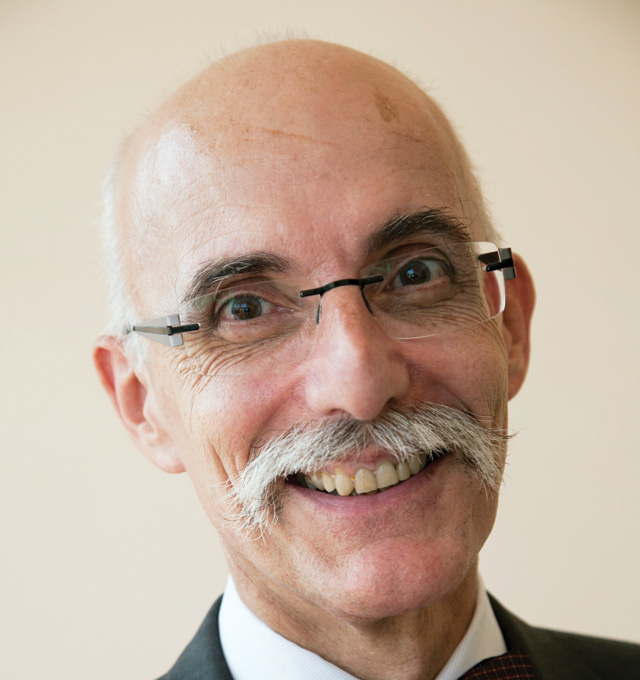
“I believe that the government is starting to feel the hindrances stemming from corruption. Key ministers are publicly criticising corruption as an obstacle to reforms, development and poverty reduction.”
This statement from Jean-François Cautain, the EU Ambassador to Cambodia, may have been unthinkable even six months ago, but his words are a sign that change could be afoot in a country long maligned for its staggering levels of corruption and crony capitalism.
“Increasing FDI [Foreign Direct Investment] from countries with strong compliance policies can only materialise significantly in a context of rule of law,” Cautain went on to tell Southeast Asia Globe. “The government has to combat corruption if it seeks strong, enduring economic growth and wants to secure long-term FDI.”
Major institutions such as the Asian Development Bank (ADB) concur. Its November report, entitled Cambodia: Diversifying Beyond Garments and Tourism, stated that the country needed to concentrate on creating laws and institutions that counter corruption, that a narrow tax base and weak tax administration “constrain the government’s ability to generate revenue to advance its development agenda” and that education must be upgraded to address “glaring skill mismatches and other gaps”.
One particular area noted by the ADB was corruption and inefficiency in government bureaucracy, especially “informal payments often needed to obtain government licences, permits and access to basic services”. And there is finally evidence that Cambodia’s government has been listening.
Plastered on the corridors and security windows at the business service area at the Ministry of Commerce in Phnom Penh are posters and stickers exhorting budding entrepreneurs and seasoned business owners not to pay bribes. Rates for services are listed and clearly displayed.
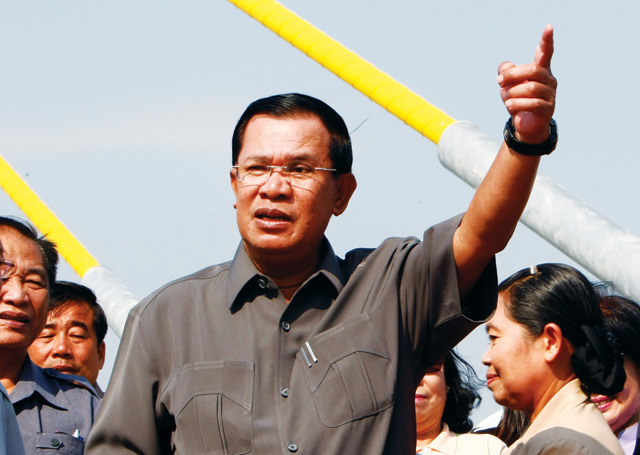
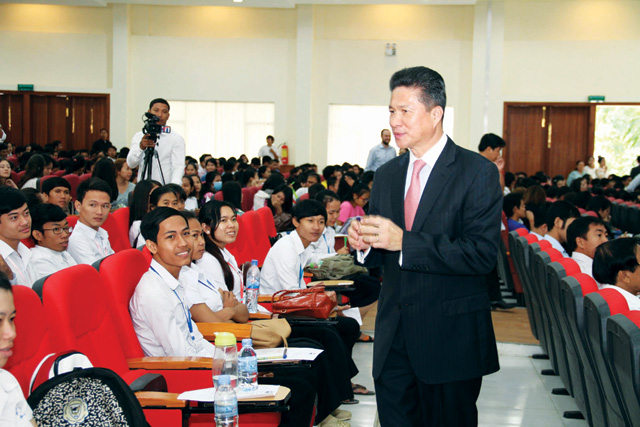
Driving the change coming under his purview is Cambodia’s minister of commerce, Sun Chanthol. With a top-notch business education in the US and plenty of experience there as an executive at General Electric, the minister has laid out his stall as a reformer.
“We’ve eliminated promotions through connections,” he told Focus Asean in November. “We’re continuing to reduce unnecessary paperwork, are speeding up approval processes, staying open longer hours to service our clientele and are developing digital-service platforms.”
According to Jeffrey Lamb, head of UK Trade & Investment at the British Embassy in Cambodia, the Ministry of Commerce has been focusing on addressing several key points noted in the World Bank’s Ease of Doing Business Index. By significantly improving in areas such as registering a business, Lamb believes Cambodia can quickly and significantly improve its ranking.
“This will be beneficial by not only providing better service and being more efficient, but will also help improve Cambodia’s image in the eyes of the foreign investor,” he said. “The more attractive Cambodia looks, especially compared to its neighbours, the more investment will come. This will have knock-on and multiplier effects, spurring a better investment environment from international investors, who will in turn continue to elevate and diversify the economy and the skills of Cambodians.”
All well and good, but without an effective body to crack down on bribe takers, progress will be slow. Cambodia set up an Anti-Corruption Unit (ACU) in 2010 and although critics such as the NGO Global Witness pointed out that its leader, Om Yentieng, has strong ties to the government, there is at least the foundation of an institution that can nab officials tempted to trouser tea money.
In December 2013, the Cambodia Beverage Company, the producer and distributer of Coca-Cola Company’s products in the Kingdom, had confidence enough in the ACU to sign a memorandum of understanding (MoU) with the body – the first business in the country to do so. The company agreed not to participate in corruption or bribery and to educate its staff to keep their hands ‘clean’ and inform the ACU of any solicitations for improper payments.
“The MoU has had an effect on our business in a positive way,” said Paul Popelier, general manager of the Cambodia Beverage Company. “It has helped to send a clear message out loud to all stakeholders who work with us that our company is a place where corruption does not exist in any form. It strengthens our relations with the Cambodian government, and it helps remove some of the challenges regarding improper payment related to our operations.”
Six more companies – including Herbalife and Prudential – have since inked similar agreements.

“I am quite optimistic that we are on the right path in the effort to promote transparency and accountability in Cambodia,” said Preap Kol, executive director of Transparency International Cambodia, when asked where he saw his country in five years’ time.
While Sun Chanthol has been shaking things up at the Ministry of Commerce, over at the Ministry of Education, Youth and Sport another foreign-educated reformer, Hang Chuon Naron, rules the roost.
Before last year’s Grade 12 exams, the minister personally oversaw the formulation of test papers, ensuring that only top officials wrote the text and even preparing some of the questions himself. This was carried out in great secrecy so that answers would not be leaked to corrupt teachers and then onto teens who were used to buying crib sheets as a matter of course. Along with rigorous security at examination halls, this resulted in the pass rate falling from 87% in 2013 to less than 25% last year.
“The steps taken by the Ministry of Education to crack down on cheating and corruption in last year’s Grade 12 exams have made students realise that it is not acceptable to cheat and bribe their way into university,” Kol said.
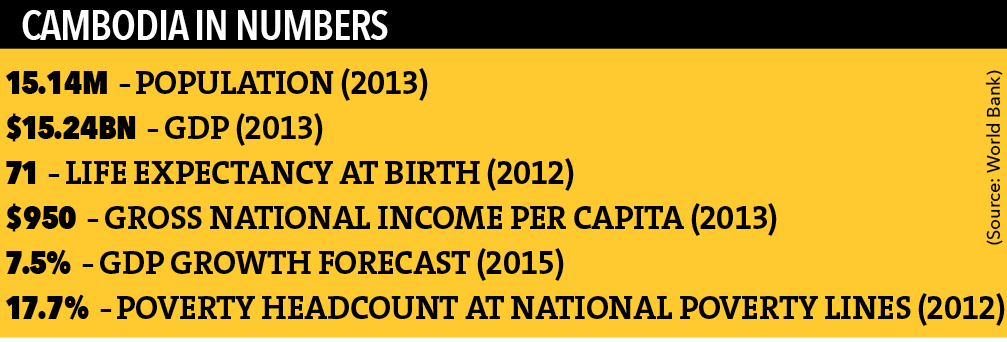
But it is not just the current wave of students that matter. If Cambodia’s aspirations to become an upper-middle income country by 2030 are to become reality it must have people with the right knowledge, skills and attitudes. A child starting primary school this year will be entering the workforce in 2030.
“This means significant investments are required now to reorient teaching and learning to develop the competencies necessary for an upper-middle income society and country,” said Santosh Khatri, education programme specialist at Unesco’s office in Cambodia.
According to Khatri, curricula will need revision and systems must be put in place to monitor learning achievements. Alongside this, a professionalised generation of teachers and administrators must be introduced. He also advocates the “utilisation of information technology in teaching and learning processes, the introduction of technical and vocational education in upper-secondary education and serious attention to the quality of higher education”.
It is a tall order. But Khatri says the ministry has just finalised “an ambitious teacher policy action plan that aims to significantly change the recruitment, training, allocation and teacher support and professional development in the coming five years”.
Another foundation-laying initiative is the payment of teachers’ salaries into bank accounts. “Helping to stop leakages in cash flow means teachers are paid their full wages on time and can focus on being in the classroom,” said Cautain.
While generally positive about the reforms in the education sector, the opposition Cambodia National Rescue Party (CNRP)’s spokesman, Yim Sovann, was quick to point out that teachers’ salaries remain low, despite a recent raise from a minimum of $108 to $138 per month. The CNRP believes the minimum should be $250 per month. “[Teachers’ salaries] are very low and they cannot afford a decent living,” Sovann said. “When the stomach is empty, you cannot think about reforms.”
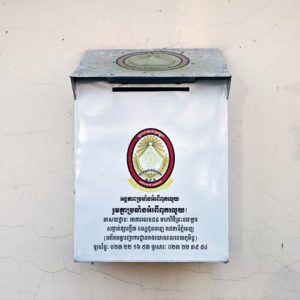
After years of entrenched corruption, revolutionising an entire country will not happen overnight, but there are a number of pressing reasons for Cambodia and its long-ruling Cambodian People’s Party (CPP) to finally make moves to clean up its act.
One strand driving change is the electorate. The CPP saw its share of the vote drop from 58% in 2008 to less than 49% in 2013. While it did not lose power, the party was certainly spooked. The CPP will need to address the concerns of the country’s young population – Cambodia’s median age is 24 – if it doesn’t want to lose more ground at the next election in 2018.
“The CPP lost a lot of support in 2013 and the reforms are the life and death of the CPP, as well as the life and death of the country,” said Sovann. “That is why they must reform. But success depends on the political will of the CPP.”
Kol believes that Cambodia’s electorate, especially young people, are the driving force making the CPP look long and hard at itself. “Citizens are scrutinising their leaders more and more and demand that they are held accountable for their actions,” he said. “This is something the government cannot continue to ignore.”
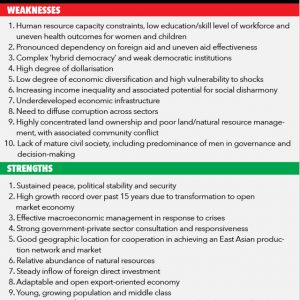
In relation to the economy, regional integration in the form of the Asean Economic Community (AEC) – supposedly coming into effect this year – is looming. In order to entice consumers from Asean and beyond to buy its goods and services, Cambodia will need to work with its regional neighbours and meet Asean-wide standards and procedures. The bar is being raised and Cambodia needs to up its game significantly.
It remains to be seen whether Cambodia can reach its long-term goals but, in the short term, reform of public administration, the public management of funds and decentralisation will be next up, according to Cautain. “The government recently committed formally to push decentralisation of public administration further to bring capacities and responsibilities of public-service delivery closer to citizens,” he said.
With a population that is increasingly engaged there is hope that, despite the challenges, meaningful change will happen in Cambodia.
“More and more people, coming from all spectrums of society… are eager to take action against corruption and promote integrity,” said Kol. “Once empowered and educated these people can help the government become more effective.”
Q&A Sun Chanthol
Cambodia’s minister of commerce discusses recent reforms, the Kingdom’s readiness for the AEC and where he sees the country heading
Tell us about the reforms that have come into effect in the past few months.
The ministry had not been reformed for 19 years. I felt that we needed to realign our roles and responsibilities, assign [new] people to the organisation and create different departments within the ministry to get people ready for Cambodia to be a successful member of the AEC by December 31, 2015. We’ve created new departments to cover Asean and Asia-Pacific, Asean partners such as China, South Korea, Japan, India, New Zealand and Australia, as well as others for the Middle East, Europe, Africa and the Americas. We also created a department to help the private sector to develop business further; a training institute to train our people and do research on commodity pricing; a division for trade-support services issuing certification, company registrations and trademarks; and one for trade promotion. It’s been a major revamp.
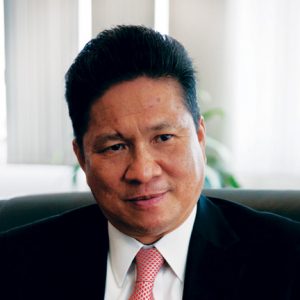
We reorganised the whole recruitment process for the heads of department [using a sealed envelope evaluation process]. So it’s not who you know, it’s what you know that gets you the position. This had never been done before. This culture did not exist in the Cambodian government. That’s a major reform.
Also, we’ve introduced an interim system for companies to obtain a certificate of origin. Now information can be sent to us online and we have saved two days in the process. We’re finalising our system so that there will be no direct interface with staff, so there’s no need for people to come here. And when you take the interface out, you remove unofficial payments. That should be in place by December this year.
Do you think Cambodia is ready to join the AEC?
Yes. Absolutely. Cambodia is a small, open economy. We aren’t implementing every single part of the AEC blueprint but we are only behind Malaysia and Singapore in terms of the level of provisions for the AEC blueprint. That’s because we don’t have non-tariff measures in Cambodia. But with an open, smaller economy we can move faster in terms of regulations and provisions for the blueprint.
Where do you see Cambodia in five years’ time?
I see Cambodia moving from a low-income country to a middle-income country. So our people will have a better standard of living and better jobs – semi-skilled jobs, not in a labour-intensive industry. We also want to see Cambodia become an exporter. We want to export more rice, export more processed food, so we will be one of the food suppliers to the world.
What do you see as the possible threats within that period?
A threat for us is how fast can we bring up our skilled labour force. How fast can we do all the technical education training and use our resources? If you cannot provide skilled labour, [foreign investors] are not going to come.
Q&A Hang Chuon Naron
Cambodia’s minister of education discusses the Kingdom’s readiness for the AEC, what skills the country needs to benefit from Asean integration and how much teachers should be paid
What strengths does Cambodia have in terms of education as it moves into AEC membership?
There are ten countries in Asean, but within those countries you have a lot of differences. You have Cambodia with $1,000 per year average income and Singapore with $50,000. The education systems in each country in Asean are very different from one end to the other. For Cambodia, we will have to try our best to compete with other Asean members. We have focused on primary education, but also increased access to secondary education and, more importantly, the quality of higher education.
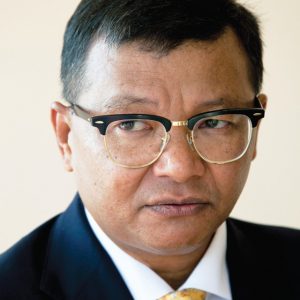
We have to diversify economically. Our economy is based on the garment sector, agriculture, tourism and construction. So in order for Cambodia to compete in Asean we must provide the skills. We are aware there is a skills mismatch, so we must address that mismatch and provide more relevant training to Cambodians. The AEC is another milestone and we will have to increase our capacity to get ourselves into a better position. But we are a small country with an open economy, which puts us in a better position to compete in Asean.
What skills do you want a child who is joining primary school this year to leave high school with in 2030?
The goal that we have right now is to give people the right foundation. By 2030 we want Cambodia to produce a lot of agricultural products, have agribusiness, an electronics sector. Right now, we can’t know exactly how many experts we will need in each sector. But we do know we want to give people a strong foundation, so that they will be able to become not only engineers but managers and such like. We want people to be able to follow a path of lifelong learning. What is a strong foundation? That would be languages, critical thinking, working in a team – soft skills and hard skills.
Teachers’ salaries have gone up from $108 to $138 per month, but some are still calling for $250 per month. Is this realistic?
Salaries are commensurate with economic development. So if we are able to diversify economically, increase income, export more and generate more revenue, then we will be able to increase salaries. So I don’t want to set a limit, it’s a matter of our economy. We plan to increase salaries consistently, commensurate with increasing prosperity.


